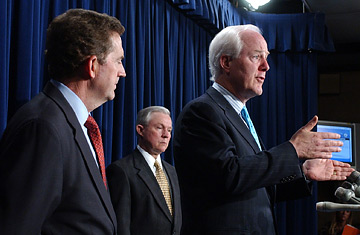
Sen. John Cornyn, R-Tex., right, accompanied by Sen. Jim DeMint, R-S.C., left, and Sen. Jeff Sessions, R-Ala., discusses immigration reform legislation in the Senate, June 25, 2007.
(2 of 2)
Another problem opponents have with the legislation is the fact that it was negotiated over three months by 12 bipartisan senators without the input of the full Senate, as laws are usually crafted.
"At a time when the public's confidence in the Senate is at a 10 year low, it makes no sense to me to try and write what is arguably [the most] important domestic legislation that this Congress has addressed in years behind closed doors," said Cornyn. "The very process [by] which this legislation was created has not increased public confidence, it's increased skepticism." Nevermind that Cornyn was once one of the original 12 negotiators, who only left the process when his own party wouldn't accommodate amendments that would've soured the bill for the Democrats.
Noticeably silent most of the day were the Democrats, who were surely happy to stand by and let their counterparts across the aisle go at it amongst themselves. Senate Majority Leader Reid waited until the cusp of most newspaper deadlines—6:56 p.m. Eastern—to weigh in, and even then the bulk of his response cited Republican support for the measure.
"I appreciate the concerns expressed in your letter but consider them misplaced," Reid said. "Senator McConnell and I have worked together in good faith to ensure a full, open and productive debate on a bill of overriding national importance that is supported by many Republicans and endorsed by President Bush."
A similar group of GOP senators wrote a separate letter to Reid June 12, asking him to strip out the bill's tough border security measures—which allot $4.4 billion to beef up border security, including doubling the border patrol and building hundreds of miles of fences—so they could be voted on separately. The conservatives remained bitter that they are being forced to vote against these provisions because they're tied to the overall bill.
Rejecting anything but comprehensive reform that also includes a controversial guest worker program long sought after by big business, Bush two weeks ago went to the Hill to plead his case to Senate Republicans and succeeded in getting the list of more than 20 amendments agreed to by both sides.
Since then, Bush has been on a full court press too get the last 10 to 12 undecided senators onto his side. He made personal calls last week and immigration was the subject of his weekly Saturday radio address and of a briefing at the White House planned for Tuesday. Bush plans to continue his campaign through the week with the Senate expected to vote on final passage Friday. Then he'll turn his efforts to the House, which is expected to pick up the measure next month.
